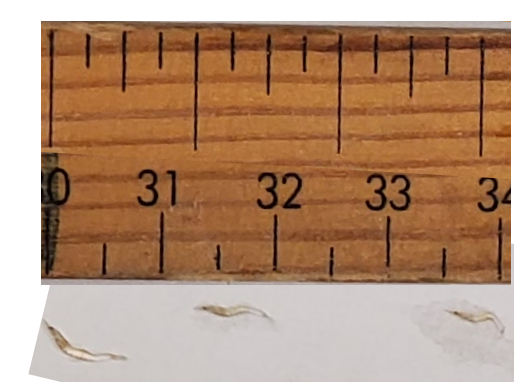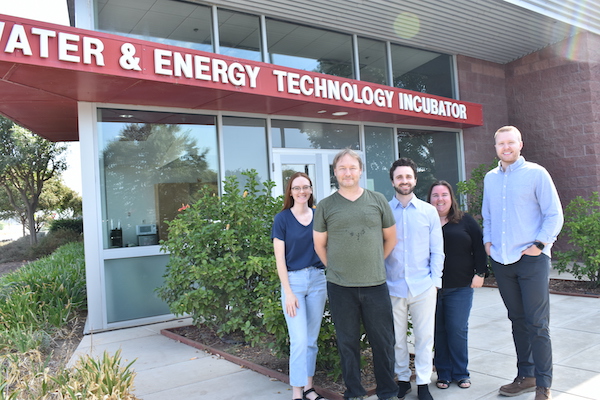
For nearly the last decade, Glen Schrader, president of Mojave Seafoods, has been working on managing the microbiome of shrimp farms in a facility in the Mojave Desert to cultivate, healthy, premium shrimp in a shorter time. Photo by Frank Lopez
Written by Frank Lopez
The Water, Energy, and Technology (WET) Center at Fresno State has announced 10 new companies for its Valley Ventures accelerator program.
This is the WET Center’s seventh cohort for the Valley Ventures program, which is dedicated to furthering water, energy, and agricultural technology startups seeking to commercialize technology and build markets in California and beyond.
The three-month online program is set to begin this month, with a strong emphasis on sales growth, investor fundraising, industry networking and business development.
This year’s cohort includes three businesses from the San Joaquin Valley — Mojave Seafood Inc. in Fresno, HyVerde in Merced and Renewell in Bakersfield.
Mojave Seafood Inc. is a startup producing seafood in the Mojave Desert that will serve Southern California and the Bay Area using the Aqua-μ Technology Suite, a propriety, interactive group of technologies.
A microbiome is the community of microorganisms found in any habitat. Or in the case of the body, the human gut.

The technology results in higher stocking densities and faster growth rates compared to traditional aquaculture methods, said Glen Schrader, president of Mojave Seafood.
“There is a huge future for aquaculture and I realize that the aquatic microbiome is completely understudied,” Schrader said. “There are a whole bunch of benefits that microbiomes provide to their host animals.”
Since the shrimp are eating, breathing, and living in the water, managing the microbiome made Schrader realize that there are plenty of advancements to be made in aquaculture microbiome management.
Originally from Ontario, Canada, Schrader relocated in August to live in Fresno.
He has a background in the solar industry since 2005, successfully building and selling a solar company in 2015. He also started a vertical farming venture in Nova Scotia, selling it to an Australian company in 2019.
Schrader also has experience in biomass fuels, which spurred his interest in microbiomes and aquaculture.
The venture for shrimp farming has been almost a decade in the works from initial research to getting ready to present the first batch to restaurants this December.
Schrader had the technology slated for commercialization in 2019 and was ready to head for the U.S., but then Covid-19 hit. He decided to wait before moving and starting up his work.
Since shrimp is already positioned as a premium seafood product, the first target niche will be premium restaurants, which makes the venture more viable, he said.
Schrader was also struck by the feed conversion ratios between fish, chicken hogs and cattle. It takes 1.1 kilograms of dry food to make shrimp grow by 1 kilogram of fresh weight as opposed to a cow, which takes 6.8 kilograms of feed to gain one kilogram of body mass.
Better management of the microbiome eliminates many environmental issues related to shrimp cultivation, leading to healthier shrimp that grow faster and bigger, he said. Traditional cultivation practices prevent shrimp from getting large, which leaves seafood companies having to choose between producing a few large shrimp or many small shrimp.
Aqua-μ (μ is the Greek letter “mu” — which in this case symbolizes “micro”) is a suite of systems and technologies Schrader developed that allows Mojave Seafoods to better monitor the microbiome and raise the healthiest shrimp. He said using these technologies will bring costs down and increase productivity.
Other water management systems, such as BioFloc’s fish farming technology, can produce a stocking density of 250 shrimps per cubic meter, while Mojave Seafood’s Aqua-u suite can produce a stocking density of over 600 shrimps per cubic meter, Schrader said.
Schrader said that most US producers using BioFloc have gone bankrupt.
“You can take one of these facilities and put them anywhere,” Schrader said. “If I can grow seafood in the desert, then I could grow it anywhere.”
The two-acre facility in the desert near Lancaster is bio-secure, reducing the risk of diseases for the shrimp, producing a premium product, Schrader said.
The U.S. Soybean Export Council, which produces animal feeds for most types of livestock, predicts aquaculture will be the greatest source of animal protein consumed globally by 2050.
Schrader said that with the growing interest in what aquaculture can offer — paired with water scarcity and environmental restrictions — it is very possible the Central Valley will be home to seafood farms soon.
Schrader is currently looking for investors to help the company grow and is preparing the first batch of product to take to restaurants. He expects to start commercial operations by the first quarter of 2023.
Mojave Seafood Inc. is also working on an AI system that will further increase productivity.
Schrader said that being based out of the WET Center has helped get Mojave Foods attention and interest in his commercial operations.
Participating founders of the ventures will meet with advisors every two weeks through the duration of the program to gain insights into growing their business.
“This year’s program will consist of intimate fireside chats with keynote speakers, including thought leaders on cleantech and ag-tech, representatives from industry, and forward-thinking early-stage investors,” said Benjamin Francis, WET Center’s venture development manager. “I am incredibly excited for each of these companies to engage with leaders and grow their businesses, not only in the Central Valley region but in California as a whole.”
Behold: Companies selected for VV7

The WET Center at Fresno State has selected its seventh cohort of businesses to take part in the Valley Ventures (VV7) accelerator program.
In addition to Mojave Seafood, participating startups include:
AGXactly / San Francisco
AGXactly helps farmers by providing them with the outputs of advanced imaging analytics without having to touch the software or technology itself. Their industry-leading insights are produced and rapidly delivered to the farmer’s production, harvesting and sales teams. The data collected and provided in their reports can help farmers earn more dollars/acre. AGXactly is currently focused on bringing value to specialty row crops and niche broad acreage crops.
dAlchemy / Milpitas
dAlchemy is a data sciences company. They build Smart PdM (Predictive Maintenance) solutions using ML/AI technologies that provide predictive and prescriptive insights, for safety, reliability and predictive maintenance of machines and for their efficient maintenance. They have validated both the applicability and feasibility of their approach, which provides insights by collecting requisite data in a very non-intrusive way. A predictive maintenance solution they have developed is currently being used by an ag-tech company to monitor the performance, health and maintenance needs of IoT infrastructure (devices, sensors, batteries, photovoltaic panels and more).
DetoXyFi / Boston, Massachusetts
DetoXyFi, takes discarded sapwood and uses a patented process to convert it into low-cost and highly effective water filters. Developed over 10 years of extensive research at MIT, the technology can filter out chemicals, metals, microplastics and pathogens (virus, bacteria, protozoa), which their testing has shown is unparalleled by any existing commercial solution. Their field testing has shown that the filter exceeds World Health Organization standards. As such, DetoXyFi’s primary aim is to provide access to clean drinking water to everyone irrespective of socio-economic status.
Eden Technologies / Washington, Utah
Freshwater generated from seawater, on average, costs two to four times more than water acquired from fresh groundwater sources. Eden Technologies has developed a reverse-osmosis centrifuge that appends to existing desalination plant pressurized waste streams to produce 30-40% more freshwater, effectively doubling plant profitability.
HyVerde / Merced
HyVerde combines power conversion hardware with control software to enable more sustainable energy storage systems in transportation and grid applications. Their hybrid balancing technology can control the power to or from multiple types of battery modules at a higher level of granularity, introducing new degrees of freedom that can improve the sustainability, energy efficiency, longevity and safety of energy storage systems. HyVerde technology will be integrated into zero-emission vehicles, such as battery-based electric vehicles.
Polzmann / Menlo Park
Polzmann is an industrial data-ops startup. Industrial data has an 8% utilization rate due to informational technology and operational technology islands. Polzmann’s Digital Twin System enables customers to turn industrial data into their internal “real-world model” to unlock its value on an unprecedented scale. The model enables organizational speed, agility, performance improvement, trust in data, and collaboration.
Relyion / Santa Clara
Relyion is developing a technology that can utilize batteries “as is” without the need for grading and, hence maintaining economic benefit. The technology is a software solution powered by machine learning and artificial intelligence and enabled by innovative hardware implementation. The technology has an entitlement benefit of up to 65% capital expenditure and levelized cost of storage reduction vs. new and other second use energy storage system technologies. Relyion estimates the utilization of second use batteries will avoid CO2 emissions of 240-2,100 million tons by 2050 due to repurposing and increased renewable penetration.
Renewell / Bakersfield
Renewell leverages pre-existing infrastructure (wellbore vertical drop, electrical infrastructure from previous pumpjacks, communications networks and roads) to create the lowest cost energy storage on the market (capital cost = $50/kWh). The company retrofits already grid-connected inactive wells using a proprietary gravity-based mechatronic energy conversion system and an intelligent controls platform for remote monitoring and control. Renewell will partner with oil and gas companies to seal and convert 33% of the idle wells in the U.S. into 132GWh of storage, decrease the idle well population, reduce methane leakage and provide best-in-class energy storage services.
Stor Water / Monterey
Stor Water’s data analytics platform allows small and medium-sized municipalities to deploy powerful predictive tools on top of their GIS (Geographic Information System) or EPANET (water distribution modeling software) models. Their tools allow water managers to plan, incrementally update and operate the water distribution system optimally with minimal system interference. Ultimately, Stor Water’s mission is to work with small and medium-sized water municipalities to digitize and tackle the ever-present water distribution system leakage that can cost 10-25% of the annual water production.








